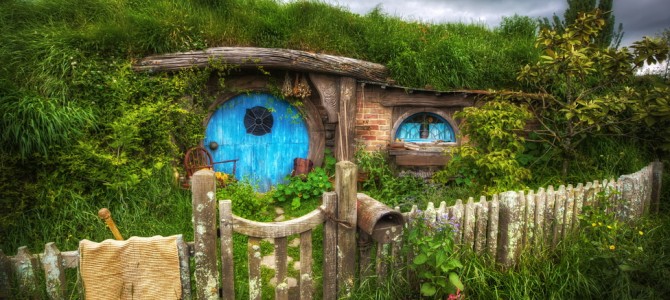Moviemakers have a habit of spicing stories up by making them all the same. Like sodium in fast food or sugar in soft drinks, Hollywood’s seasonings reduce their original ingredients to something blandly marketable. Some stories deserve this. Tolkien’s, however, do not. Peter Jackson’s movies about Middle Earth display enthusiasm for Tolkien’s world. Yet in one important regard, Jackson’s portrayal of Bilbo Baggins in the first “Hobbit” movie is sadly ill-conceived. Mr. Jackson films as if he has forgotten what hobbits represent.
Hobbits are the epitome of domesticity. Admittedly, they are also stodgy, traditional, and devoted to food and trivial hobbies. They are even exasperatingly insular. For example, Rosie reproaches Sam at the end of “Return of the King” for leaving the Shire and running off on an adventure just when things became dangerous at home. She clearly has no understanding of his role in saving the world (including the Shire), and thinks that he ought to have stayed behind to grapple with the hardships that she did experience. Yet the hobbit insularity that seems so narrow is ultimately strength, because at its heart is a tremendous love of home. It is this love that protects the hobbit ringbearers from corrupt ambition, and also spurs them on to save their world. Tolkien celebrates the incredible endurance that such a mix gave to Bilbo, Frodo, and Sam even as he pokes fun at the stodgier hobbits who disapprove of anything “foreign.” He writes about hobbits with an exasperated, affectionate admiration that is typical of English books about English people. The hobbits and their Shire are perhaps not too different from the historic country folk of England. Just as England was jolly well worth saving during two world wars, ignorant hobbits like Rosie were what Sam and Frodo nearly die for.
Our modern world sees little strength in domesticity (how many of us encourage men to choose lower-powered careers so that they can spend more time at home, or admire women who become housewives?). In Peter Jackson’s “The Hobbit: An Unexpected Journey,” Gandalf looks at Bilbo with grief and disappointment because he no longer expresses a desire to see the world. It would apparently be tragic if Bilbo did not throw off his obsession with doilies and clean handkerchiefs in order to reach his real potential as an adventurer. Now, this might appear similar to what happens in the book. Tolkien’s rather fussy, complacent Bilbo did originally shut the door on Gandalf and had to be nudged on to adventure. Yet the flavor of Tolkien’s original story is different: the Bilbo of the book did not require an anti-doily lecture from Gandalf. His own inner desire for adventure is (just barely) enough to overcome his stodgier impulses and send him running after the dwarves.
In Tolkien’s “The Hobbit,” Bilbo’s ordinary, slightly-fussy, middle-age characteristics are endearing. In the end, because they are tied to his love of home and therefore his sense of right and wrong, they are part of his moral strength. Bilbo demonstrates the quiet heroism that often comes out of ordinary domesticity. Yet in Peter Jackson’s version, Bilbo’s fussiness comes across as the “before” half of a “before and after” photo shoot. It is merely an impediment that must be shed. Bilbo must become an action hero. The manner in which he saves Thorin from Azog demonstrates this. It is understandable that Peter Jackson wanted to provide Bilbo with a story arc for the first movie, but Tolkien’s Bilbo is not supposed to be an action hero who knocks down goblins twice his size and slays them with his little sword, let alone doing so while all the more experienced fighters (the dwarves and Gandalf) stand frozen. It is significant that even though Tolkien’s Bilbo battles spiders when he must, Tolkien does not make his hobbits into goblin fighters who engage in epic battle scenes. Hobbits are the little people. They are the ones who are of little use in battle, the ones who belong at home, the ones who represent the hopelessly ordinary part of all of us. The whole message of hobbits is that great strength lies in the little, domestic folk who cannot be epic heroes, yet who help to save the world by embracing the unexpected burdens that they can carry. The world is saved by people who love their home.
I’m too much of a purist and a crank to watch “The Desolation of Smaug” (elf warrior maidens who engage in love triangles with a dwarf and Legolas? That makes my inner, cranky purist sputter), but I wonder if Peter Jackson got Bilbo right this time or not. You all will have to let me know.
Anna blogs at Don’t Forget the Avocados.









